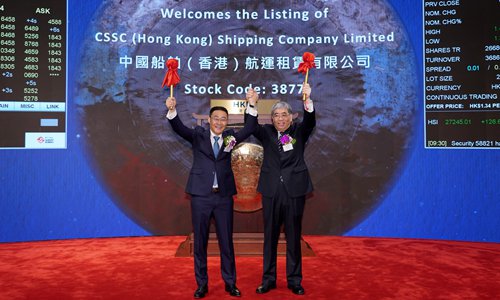
CSSC (Hong Kong) Shipping, a subsidiary of leading state-owned shipbuilder CSSC, floats shares on the Hong Kong stock exchange in an IPO on Monday. The company suggested that the trade war has had basically no impact on its operations, as less than 20 percent of the routes are affected by the trade row and customers are adjusting. The shares closed down 7.5 percent at HK$1.24 ($0.16). (Photo: VCG)
The gradually stabilizing situation in Hong Kong is one reason that companies are resuming IPOs on the Hong Kong bourse, analysts said on Sunday.
Logistics real estate developer ESR Cayman and Anheuser-Busch InBev both announced plans last week to revive IPOs that were shelved over the summer.
The two IPOs are both heavyweights. Budweiser Brewing Co APAC - AB InBev's Asian unit - would be the largest among pulled deals globally this year, with ESR Cayman the third-biggest, according to media reports.
The gradually stabilizing situation in Hong Kong is behind the return of these IPOs, said Liu Ying, a research fellow at Renmin University of China's Chongyang Institute for Financial Studies.
"The underlying meaning .. is that investors' outlook for Hong Kong remaining as a global financial center recuperated a bit over the past weeks," Liu told the Global Times on Sunday.
IPOs in Hong Kong basically froze in August, with only one offering compared with 17 in July, according to an August 30 report by the 21st Century Business Herald newspaper. The cold performance is in stark contrast to last year. On July 12 last year, eight companies held IPOs on just that day, the report said.
The city, a global financial hub, was affected by three months of chaos with increasingly violent protests.
"Many business events and tourism programs were quietly cancelled due to the social unrest," Liu said.
Yao Changchun, a veteran Hong Kong stock investor based in Shenzhen, South China's Guangdong Province, told the Global Times on Sunday that the low valuations in Hong Kong in August were a reason why companies shelved their IPO plans.
"Companies will turn away from listing on a bear market, where share valuations seriously deviate from reasonable levels," Yao said. "Unrest affects everything."
The Hang Seng Index plunged to a six-month low of 25,281.3 points on August 13 but has since recovered in September.
The rebound coincided with the moves announced by Hong Kong Chief Executive Carrie Lam Cheng Yuet-ngor on September 4 to end unrest, including the formal withdrawal of an extradition bill.
Jeff Zhang, a veteran financial industry practitioner, said the situation in August made investors nervous and uncertain.
"Now investors see the situation is winding up and is under control, and this makes resuming IPOs possible," Zhang said, noting that not listing in Hong Kong, a gateway to the vast Chinese mainland market, would mean a huge cost for many companies whose main businesses are in Chinese mainland.
Liu said more companies could follow suit by considering IPOs in Hong Kong, provided that stability can be restored to the city, which remains a unique venue for financing.


